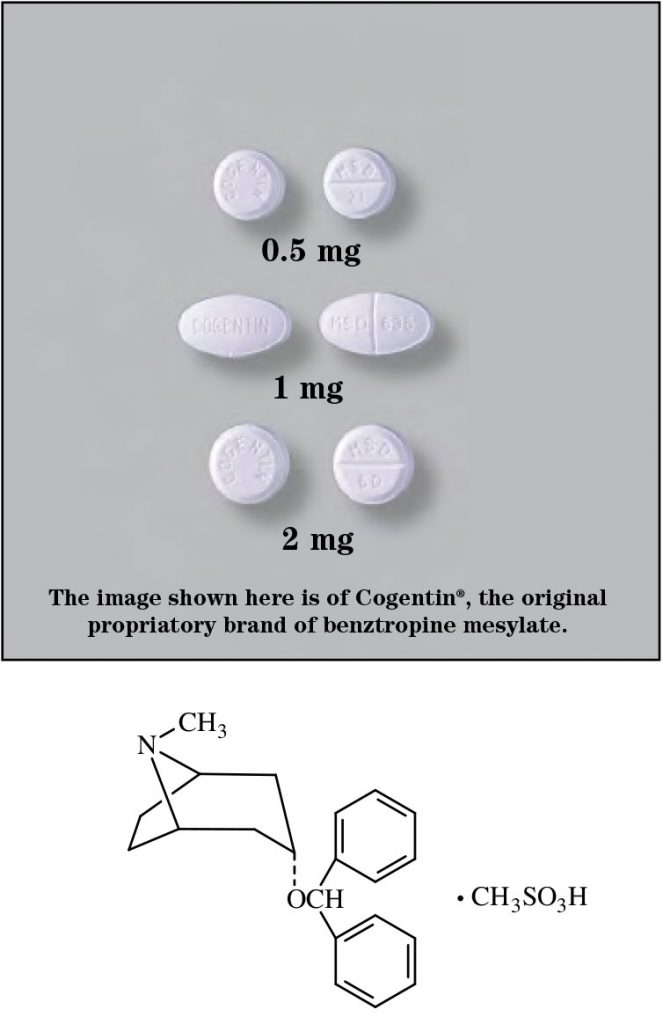
benz trō’ pēn mes’ i lāt
Brand Names: Cogentin®
- Generic only
Common Dosage Forms:
- Tablets: 0.5 mg, 1 mg, and 2 mg
- Injection: 1 mg / mL (9 mg NaCl / mL)
FDA Indications/Dosages:
- For the control of extrapyramidal disorders (excluding tardive dyskinesia) due to neuroleptic drugs: 1 mg to 4 mg once or twice a day given orally or parenterally. Dosage must be individualized according to the need of the patient. For acute dystonic reactions give 1 to 2 mL intramuscularly, followed by 1 mg to 2 mg orally once or twice a day to prevent recurrences.
- For use as an adjunct in the therapy of all forms of Parkinsonism: 0.5 mg to 6 mg per day, orally or parenterally, in two to four equally divided doses or a single dose at bedtime.
- Not recommended for children under 3 years of age.
Pharmacology/Pharmacokinetics:
Benztropine mesylate is an active inhibitor of both cholinergic and histaminc receptors. It’s therapeutic action is largely due to it’s selective blockade of cholinergic receptors in the parasympathetic nervous system. Chemically it has structural similarities to both atropine and diphenhydramine.
Drug Interactions:
May decrease the effects of phenothiazines and haloperidol. Use with phenothiazines, haloperidol, and tricyclic antidepressants has caused paralytic ileus, hyperthermia, and heat stroke. May cause tardive dyskinesia when used with haloperidol.
Contraindications/Precautions:
Contraindicated for use in patients with prostatic hypertrophy or bladder neck obstructions, myasthenia gravis and in children under three years of age. Use with caution in pregnant women and in patients with tachycardia, prostatic hypertrophy or angle-closure glaucoma. Use caution in patients exposed to hot weather. Paralytic ileus has occurred when benztropine has been used concomitantly with phenothiazines or other anticholinergics. Patients should be advised to report gastrointestinal complaints promptly. Pregnancy Category C.
Adverse Effects:
Dry mouth, blurred vision, constipation, nausea, numbness of the fingers, depression, and nervousness. Side effects may decrease with prolonged use. More serious potential adverse effects include tachycardia, toxic psychosis, and heat abnormalities.
Patient Consultation:
- May take with food or milk if GI upset occurs.
- Avoid alcohol and other CNS depressants while using benztropine.
- Do not discontinue therapy unless otherwise directed.
- Avoid prolonged exposure to hot weather.
- Store in a cool, dry place away from sunlight and children.
- If a dose is missed take it as soon as possible. If it is closer to the time of your next dose than the dose you missed, skip the missed dose and return to your dosing schedule. Do not double doses.
- Contact a physician if the above side effects are severe or persistent.